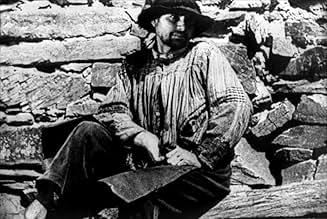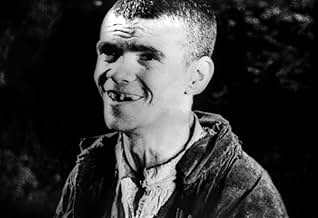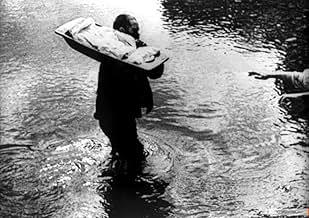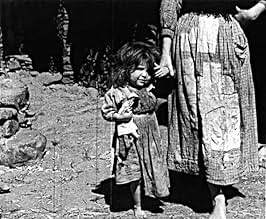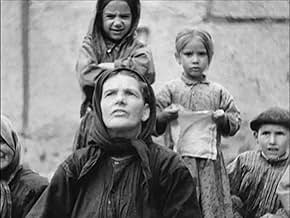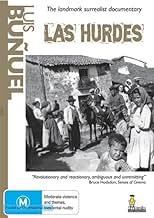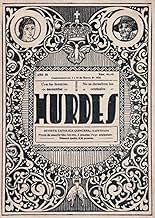Las Hurdes
- 1933
- 30 मि
IMDb रेटिंग
7.3/10
6.5 हज़ार
आपकी रेटिंग
अपनी भाषा में प्लॉट जोड़ेंA surrealist film, a pseudo-documentary portrait of Las Hurdes, a remote region of Spain where civilisation has barely developed, showing how the local peasants try to survive without even t... सभी पढ़ेंA surrealist film, a pseudo-documentary portrait of Las Hurdes, a remote region of Spain where civilisation has barely developed, showing how the local peasants try to survive without even the most basic utilities and skills.A surrealist film, a pseudo-documentary portrait of Las Hurdes, a remote region of Spain where civilisation has barely developed, showing how the local peasants try to survive without even the most basic utilities and skills.
- निर्देशक
- लेखक
- स्टार
फ़ीचर्ड समीक्षाएं
I saw this movie with absolutely no idea what it would be about or when this movie was made, only that it was made by Luis Bunuel, and I felt I HAD to at least have seen 1 movie made by the man so many people see as one of the many movie gods.
I must add that before seeing Las Hurdes ("Land Without Bread") in the theatre where I saw it, they had programmed the documentary "Bunuel's Prisoners". In which the people of the Hurdes region comment on the movie and the circumstances under which this movie came to be. This movie gave me enough information to watch the main feature (Las Hurdes) with a much more realistic view than if I had seen this movie without seeing the doumentary first.
In the documentary several people express their annoyance and irritation with the manner in which Bunuel has twisted and fabricated some of the scenes in the actual movie/documentary. The goat falling from the cliff is not exactly falling per accident and the "dead" baby in one of the last scenes is not dead at all (this can be seen by watching the moving chest of the baby).
All in all I enjoyed this slightly fictional documentary very much and I recommend everybody to go see it. It will either make you laugh out loud at times and leave you deeply disturbed at other times.
A must for people who are not allergic to foreign movies from before WW2. 9/10
I must add that before seeing Las Hurdes ("Land Without Bread") in the theatre where I saw it, they had programmed the documentary "Bunuel's Prisoners". In which the people of the Hurdes region comment on the movie and the circumstances under which this movie came to be. This movie gave me enough information to watch the main feature (Las Hurdes) with a much more realistic view than if I had seen this movie without seeing the doumentary first.
In the documentary several people express their annoyance and irritation with the manner in which Bunuel has twisted and fabricated some of the scenes in the actual movie/documentary. The goat falling from the cliff is not exactly falling per accident and the "dead" baby in one of the last scenes is not dead at all (this can be seen by watching the moving chest of the baby).
All in all I enjoyed this slightly fictional documentary very much and I recommend everybody to go see it. It will either make you laugh out loud at times and leave you deeply disturbed at other times.
A must for people who are not allergic to foreign movies from before WW2. 9/10
I have been frustrated by the version of the film that is available in my area, entitled "Unpromised Land". The original "Tierra sin Pan" has a completely different commentary which is made "politically correct" in the "Unpromised" version. Avoid "Unpromised Land" as it censors and alters the original intent of the film as conceived by Bunuel!
After Un Chien Andalou and L'Age d'Or had caused such earthquakes, Bunuel picked for his next project a documentary on the Hurdanos. These people live in mid-western Spain, near the border of Portugal, under the most horendous conditions possible. They are a primitive, almost neolithic people, who only barely understand the principles of farming and are otherwise so superstitious as to starve themselves rather than eat any animals besides disease-carrying pigs.
Now, it is difficult to know how to take this film. Following Un Chien Andalou and L'Age d'Or, I personally expected a comedy, and took it as that when I was watching it. If you read down, you will notice the first person who commented on the film takes it this way. My reasoning went thus: Bunuel saw the Hurdanos in his peculiar surrealist light. Here was a people degraded to the point of utter absurdity. For instance, there is a scene where the farmers are working in a place where adders are plentiful. The adders frequently bite them, but these bites are not fatal. They would eventually heal, but these people don't know that. Instead, they use a kind of ointment to cover the wound, and this treatment actually leads to infection, which eventually mangles or even kills them. In another scene, we are told that the children only know bread from the bits that the local church gives them. They are not allowed to take these bits of bread home because their parents don't trust bread, and will confiscate it and toss it out (this is what I read in an essay about the film; the version I watched had an English voiceover, whose explanation for the parents' actions was to steal the bread for themselves. I believe that the version in the essay is the more correct one).
The surrealist aspects of the scenes I mentioned are there. But, reading that aforementioned essay (and a second), I realize that I was wrong about the humor. Surrealism, you should note, does not = comedy. This is a more serious surrealism. In fact, Bunuel made the documentary as a political statement, showing how the Spanish government treated its people (in fact, he was wrong on this point; Franco idolized the area and had great sympathy for the people, believing them to represent the primitive aspects of Spain; in later decades, he would pour a lot of money into the region). It caused an upset, though not as much as the previous two films. I imagine that people then didn't know how to take it either, since many critics were up in arms over this apparently massive change in Bunuel's style. Nowadays, Las Hurdes seems better than ever before. It is an amazing documentary, and the people represented in it deserve our sympathy. I wonder if their lives have now changed. 9/10.
Now, it is difficult to know how to take this film. Following Un Chien Andalou and L'Age d'Or, I personally expected a comedy, and took it as that when I was watching it. If you read down, you will notice the first person who commented on the film takes it this way. My reasoning went thus: Bunuel saw the Hurdanos in his peculiar surrealist light. Here was a people degraded to the point of utter absurdity. For instance, there is a scene where the farmers are working in a place where adders are plentiful. The adders frequently bite them, but these bites are not fatal. They would eventually heal, but these people don't know that. Instead, they use a kind of ointment to cover the wound, and this treatment actually leads to infection, which eventually mangles or even kills them. In another scene, we are told that the children only know bread from the bits that the local church gives them. They are not allowed to take these bits of bread home because their parents don't trust bread, and will confiscate it and toss it out (this is what I read in an essay about the film; the version I watched had an English voiceover, whose explanation for the parents' actions was to steal the bread for themselves. I believe that the version in the essay is the more correct one).
The surrealist aspects of the scenes I mentioned are there. But, reading that aforementioned essay (and a second), I realize that I was wrong about the humor. Surrealism, you should note, does not = comedy. This is a more serious surrealism. In fact, Bunuel made the documentary as a political statement, showing how the Spanish government treated its people (in fact, he was wrong on this point; Franco idolized the area and had great sympathy for the people, believing them to represent the primitive aspects of Spain; in later decades, he would pour a lot of money into the region). It caused an upset, though not as much as the previous two films. I imagine that people then didn't know how to take it either, since many critics were up in arms over this apparently massive change in Bunuel's style. Nowadays, Las Hurdes seems better than ever before. It is an amazing documentary, and the people represented in it deserve our sympathy. I wonder if their lives have now changed. 9/10.
Luis Buñuel's approach to film-making was so unusual, and his intentions so hard to decipher, that you can never be quite sure what his movies were meant to convey. So it should probably not be too surprising that even when he makes a documentary it is still hard to tell exactly what he was doing. While this gives every initial appearance of being a straightforward documentary, it is not long before Buñuel's detailed yet surrealistic approach begins to show in subtle ways.
Whatever else may be true, it is an unusual film, and a generally interesting one. It is also unsettling - at times, very much so. It depicts a civilization that, though located in the midst of Spain just before the Franco era, could almost be from pre-historic times. Many of the images and much of the commentary are disturbing and uncomfortable to watch, to say the least. Yet the tone is far from emotional, and in fact it seems to be deliberately withdrawn, even unsympathetic, much of the time.
At the same time, it's easy to see why there are those who suggest that Buñuel was not filming a strictly objective documentary. While there are no outlandish or fantastical images, his distinctive style shows up in less obvious ways, through odd details and sequences. There also seem to be a number of different versions of the narration, which do not always cast events in the same light. So, as so often tends to be the cast with Buñuel, all that you can do is to watch it for yourself and then make your best guess as to what it all means.
Whatever else may be true, it is an unusual film, and a generally interesting one. It is also unsettling - at times, very much so. It depicts a civilization that, though located in the midst of Spain just before the Franco era, could almost be from pre-historic times. Many of the images and much of the commentary are disturbing and uncomfortable to watch, to say the least. Yet the tone is far from emotional, and in fact it seems to be deliberately withdrawn, even unsympathetic, much of the time.
At the same time, it's easy to see why there are those who suggest that Buñuel was not filming a strictly objective documentary. While there are no outlandish or fantastical images, his distinctive style shows up in less obvious ways, through odd details and sequences. There also seem to be a number of different versions of the narration, which do not always cast events in the same light. So, as so often tends to be the cast with Buñuel, all that you can do is to watch it for yourself and then make your best guess as to what it all means.
Bunuel had always been a visionary man,his cinema had never stopped trying from "un chien andalou" to "le fantôme de la liberté"."las Hurdes " was a documentary ,but it made the genre explode.And,to think it was seventy years ago!
Near the Portuguese border,there's a part of Spain where a doomed humanity used to live.The beginning of "las hurdes" deals with a feast in a village,last stop before the Hurdes country.
Then Bunuel begins his unthinkable depiction of this subhumanity:morons,maimed persons,monsters with twelve fingers,living in a filth you could not imagine.They drink in the brook/sewer!Springtime which everybody enjoys elsewhere is the worst season for the "Hurdes":all that remains for them to eat is cherries.But they cannot wait that they ripen,so they contract dysentery and they fall like flies.
And ,however,in a world that God seems to have completely forgotten,the children learn at school that the sum of the angles of a triangle is 180 degrees.And chiefly,they must respect the property of others(!). On the wall of the classroom,you can see a picture,showing an eighteen century marchioness!
Irony and surrealism are always here .After these horrors,out of the blue,Bunuel begins a lecture on the anopheles mosquito,complete with anatomical charts.
Banned by the Spanish government in 1933-1935,it took the Popular front(1936)to release what was the first social and political documentary.
Near the Portuguese border,there's a part of Spain where a doomed humanity used to live.The beginning of "las hurdes" deals with a feast in a village,last stop before the Hurdes country.
Then Bunuel begins his unthinkable depiction of this subhumanity:morons,maimed persons,monsters with twelve fingers,living in a filth you could not imagine.They drink in the brook/sewer!Springtime which everybody enjoys elsewhere is the worst season for the "Hurdes":all that remains for them to eat is cherries.But they cannot wait that they ripen,so they contract dysentery and they fall like flies.
And ,however,in a world that God seems to have completely forgotten,the children learn at school that the sum of the angles of a triangle is 180 degrees.And chiefly,they must respect the property of others(!). On the wall of the classroom,you can see a picture,showing an eighteen century marchioness!
Irony and surrealism are always here .After these horrors,out of the blue,Bunuel begins a lecture on the anopheles mosquito,complete with anatomical charts.
Banned by the Spanish government in 1933-1935,it took the Popular front(1936)to release what was the first social and political documentary.
क्या आपको पता है
- ट्रिवियाLuis Buñuel was not above slaughtering several animals to deliver his message; he ordered the ailing donkey to be spread with honey so he could film it being stung to death by bees. Nor was the mountain goat falling off the mountain an accident, shot by Buñuel's crew for the desired sequence.
- गूफ़In the sequence where the mountain goat falls to its death, a puff of smoke can be seen on the side of the screen. This is from a gunshot by a crew member, who shot the goat so that it would fall and be filmed as if it 'accidentally' fell off of the mountain.
- कनेक्शनFeatured in Histoire(s) du cinéma: Les signes parmi nous (1999)
टॉप पसंद
रेटिंग देने के लिए साइन-इन करें और वैयक्तिकृत सुझावों के लिए वॉचलिस्ट करें
विवरण
- रिलीज़ की तारीख़
- कंट्री ऑफ़ ओरिजिन
- भाषा
- इस रूप में भी जाना जाता है
- Land Without Bread
- फ़िल्माने की जगहें
- La Alberca, Salamanca, Castilla y León, स्पेन(main town, on location)
- उत्पादन कंपनी
- IMDbPro पर और कंपनी क्रेडिट देखें
- चलने की अवधि30 मिनट
- रंग
- ध्वनि मिश्रण
- पक्ष अनुपात
- 1.37 : 1
इस पेज में योगदान दें
किसी बदलाव का सुझाव दें या अनुपलब्ध कॉन्टेंट जोड़ें


